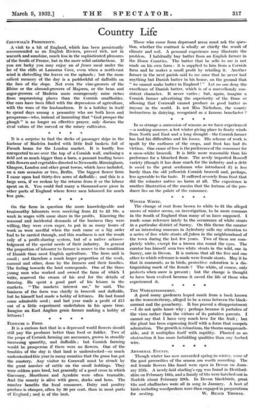On the farm in question the more knowledgeable and trustworthy
labourers were receiving from £2 to £2 10s. a week in wages with some share in the profits. Knowing the seasonal and incidental demands of the business they were willing, they were even eager, to put in as many hours of work as were needful -when the rush came or a big order
• had to be carried through, and this readiness is not the result only of a • profit-sharing system, but of a native acknow- ledgment of the special needs of their industry. In general the proportion of labourer to farmer is nearer to the condition of Danish than most English agriculture. The farm unit is small ; and therefore a much larger proportion of the work, manual and other, done by the farmers and their families. The feeling towards the land corresponds. One of the three young men who worked and owned the farm of which I write, reserved the cream of his zeal for the details of farming. He spent a good part of his leisure in the markets. "The markets interest me," he said. The business of the farm was chiefly in broccoli and daffodils, but he himself had made a hobby of lettuces. He had found • some admirable seed ; and last year made a profit of £15 out of a little experiment undertaken in his spare time. Imagine an East Anglian grain farmer making a hobby of lettuces I


















































 Previous page
Previous page